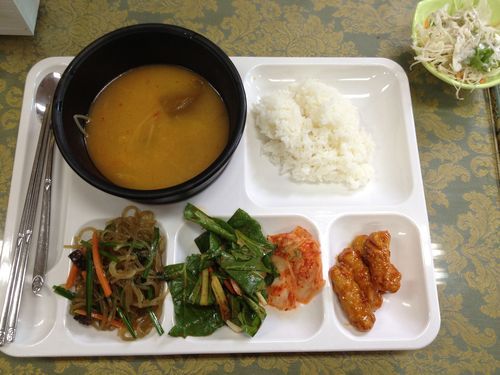Foodspotting – Advance Reflections

Its been said that you discover a country best and most originally, if you are brave enough to look into the pots and pans, to smell and taste the exotic lusciousness from the carts and cook shops on the streets or in the mouth-watering ethnic restaurants. On the first evening of our advance to Seoul, South Korea we were invited to a “gogigui restaurant”. This is a traditional form of Korean style barbecue, where meats are grilled at the center of the table, surrounded by various banchan (side dishes) like the traditional kimchi, a fermanted cabbage dish. When the meat on the grill is done, it is cut into small pieces and can be wrapped in fresh mint- or lettuce leaves alongside with rice, garlic and other seasonings. I really enjoyed this way of eating. It slows you down, since it demands some attention and skill to grill and prepare the little wraps. And for most of our cohort eating with chopsticks was a real challenge too.
What I liked best about this traditional food was its traditionalism itself.
Because in general traditional and indigenous forms of Korean culture are hard to spot in modern daily life in Seoul. Perhaps this is interlocked with the Korean history. The Korean Empire experienced glorious times especially during the Joseon dynasty, when the Koreans celebrated the zenith of their culture, science and architecture. But apart from that period, the inhabitants of the Korean peninsula faced oppression and annexation of China, Mongolia and Japan during almost all centuries. Under these circumstances it was complex to stay true to your own upbringing, culture and tradition by evolving a healthy form of patriotism. Under colonial rule and political oppression it must have been almost impossible to create a national feeling and to pass the indigenous and cultural heritage to the next generation. Those who tried lived always in the danger of ending in one of the many prisons like Seodaemun, where members of the independence movement were kept. After the Japanese occupation and the following sino-japanese war, Korea was divided into two parts. The inner Korean war (called 6:25 by the date of the outbreak) between North and South then questioned again the origin of the citizens in the two new established Korean countries: politically, traditionally and culturally. When the intervention of the United Nations stopped the war and established a state of ceasefire, the South Koreans were thankful for the 16 countries, which participated, but primarily for the US-Soldiers. Who were they? Did they conceder themselves as Koreans or South Koreans? As westernized or more spezific, americanized Koreans. How did they manage to stay true to their distinct and unique heritage?
Still today the large impact the Americans had on South Korea is quite visible in the buzzing streets of Seoul. You can find American food chains in every street. South Korea has over 400 Starbucks coffeehouses. And by 2015 McDonalds has the goal of having 500 restaurants in South-Korea. And not only the soldiers, through their military and political intervention, had a large impact on South Korea. Also the Christian missionary’s did not only bring the gospel and a theology of church doctrine and moral, but also a lot of their own ideals of culture, society and – not to forget – culinary standards.
I am asking myself, which abilities a person must have to distinguish between the new life and chances presented by political liberators that open a unknown horizon to change your life and – on the other side – to hold fast to your own traditions and culture and value them alongside some new inventions and social patterns.
I am asking which abilities one must have as a fresh christian convert to differentiate between the gospel itself and a certain lifestyle presented through the western people engaged in mission and evangelization. It is not easy to develop a new christian conduct when only inspired by missionaries of a different culture. Most likely this lead to an abandoning of the hitherto exsisting own lifestyle culture. Or is there a bible verse that forbids kimchi and seagrastea? On the streets of Seoul you can literally sense the contest between Korean gogigui and American T-bone steak.
Being in Korea I saw the disadvantages of political freedom, evangelization and economic imperialism. As western people we managed to present new and changing possibilities in the lives of many Koreans; politically, theologically and financially. But did we also help to them to value their own tradition and habits? Did we encourage enough to hold fast to distinct traditions and unique culture? Which role will our little gogigui restaurant on the other side of the streetplay in 30 years? Will tourists, searching for the real, authentic Korean food be the only interested guests then, since all Koreans are then more into western style globalized fast-food?
On all this read George Ritzer – The McDonaldization of Society (1993)
or Thess 5:21
Test everything; but hold fast what is good.
Leave a Reply
You must be logged in to post a comment.